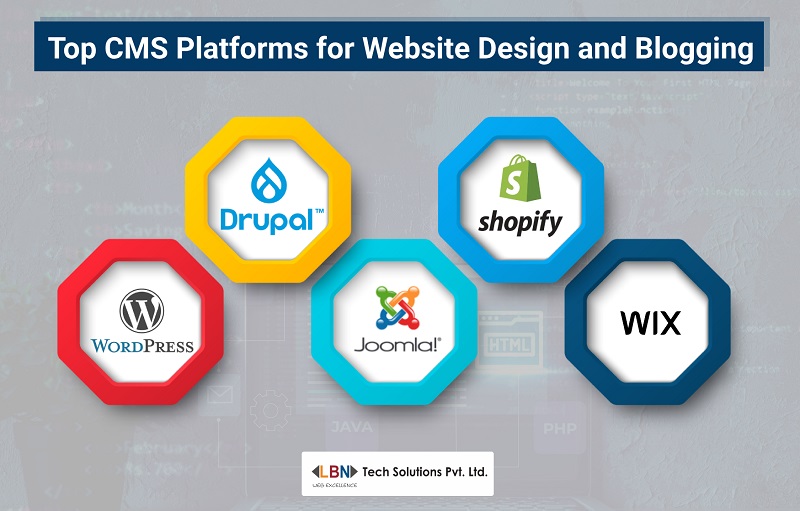Top 5 CMS Platforms for Website Design and Blogging

Table of Contents
Top CMS Platforms for Website Design and Blogging
- WordPress
- Drupal
- Joomla
- Shopify
- Wix
- Conclusion
In 2011, 76% of all the websites on the internet were hand-coded. By 2022, the figure had gone down to a mere 33%. Content management systems are the ones that brought on this change. CMS platforms have made it possible for you to create and run a website even when you don’t know a thing about coding. You can do it yourself or you can just hire a CMS website development company to do the job. Exciting, right?
CMS platforms are quite easy to understand but selecting the right one can be a tough job since there are over 800 platforms available in the market! Hence, we have curated a list of the best CMS platforms and you can pick one that will suit your requirements.
Top CMS Platforms for Website Design and Blogging
There are many pros and cons to consider while choosing CMS platforms. Based on factors like pricing, ease of use, personalization, and more, you can choose one that you think will work the best for you.
1. WordPress
WordPress is the undisputed champion of the list, powering over 40% of the websites on the internet. WordPress is a great option for all types of uses. You can be a small company trying to start a blogging site or a large organization that wants to build a complex site – WordPress can do it all!
Pros
- It is free since it is an open-source software
- User-friendly interface
- No technical knowledge or coding skills required
- Numerous options for customization
- A wide range of themes and plugins are available
- Frequent updates
- Well-designed for search engine optimization (SEO)
- Strong community support because of the large user population
- Can download all your content in XML format which makes it easy to move
Cons
- Special features need additional plugins
- Needs frequent updating
- Can be slow due to added plugins
- Target for hackers and spammers due to its popularity
- Maintenance can make it expensive
Also Read: How Does an Ecommerce Website Work?
2. Drupal
Drupal is often considered to be the highest-performing CMS platform. Arsenal, the football club, uses Drupal to run its website. If you are looking to create large-scale publications for blogging, then Drupal is the best choice.
Pros
- Easily accessible regardless of the device
- Solid design for the websites
- Huge user community
Cons
- Might be hard to work for non-developers
- Vulnerable to security concerns
- Hard to customize
- Can get expensive
3. Joomla
Joomla powers over 1.72% of all CMS websites. It is an open-source platform that is free to use but you will need hosting and a domain name. It is a great choice for those looking to build a complicated site since it offers a lot of options.
Pros
- Flexible to use
- A great choice for both developers and non-developers
- Great community support
- Can run an e-commerce store using the extensions available
- Comes with integrated SEO tools that can be enhanced with further use of extensions
Cons
- Can be slow due to the comprehensive code and mechanisms
- Limited customization
- Frequent updates can lead to compatibility problems
- Hosting costs can get expensive
Also Read: Website vs. Social Media: Is a Website Still Necessary for a Business?
4. Shopify
Shopify is a popular choice among small businesses looking for a simple and user-friendly CMS platform. It is the best option if you want to create e-commerce sites.
Pros
- Effortless setup and maintenance
- Great customer support team
- Multiple payment processor
- Availability of various themes
- Self-sufficient and does not depend on a host
- Highly secure
Cons
- It can get a little expensive
- Not the best choice for blogging
- Complicated customization setup
- Does not support email hosting
- Difficult to shift to another platform
5. Wix
If you are looking for a user-friendly cloud-based CMS platform, then Wix should be your choice. It is a great choice for small businesses, startups, and local companies that require beautiful websites at affordable prices.
Pros
- Beginner-friendly and offers a free plan
- Automatically optimizes mobile sites
- Installation of automatic security updates
- Availability of pre-made templates
- Availability of apps on the Wix market app
- Easy user interface (drag and drop editor)
Cons
- Inflexibility in changing the selected layout
- Data cannot be easily downloaded and exported
- Can’t run an e-commerce store unless you have a paid plan
- Ads in the free plan
LBN Tech Solutions
As a business owner, your time is invaluable. Partner with LBN Tech Solutions and we will ensure that your website becomes a standout success. Visit us here.
- Mar 13, 2024
